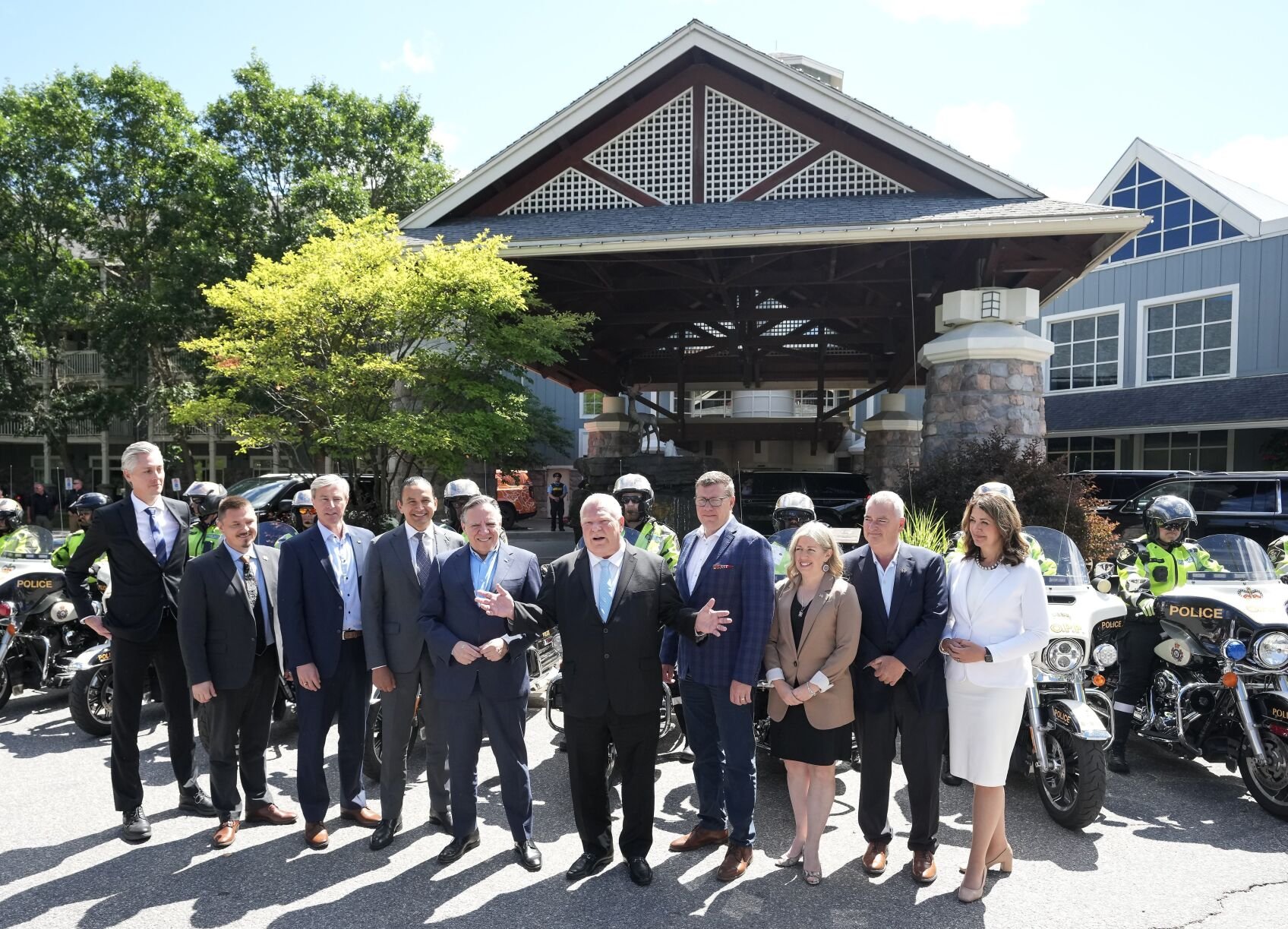HUNTSVILLE, Ont. — Frustrated at being blocked from Tuesday’s first ministers’ meeting with Prime Minister Mark Carney, Indigenous leaders are pushing for one including them amid deepening concerns about legislation fast-tracking mining and infrastructure projects in the fight against U.S. tariffs.
The request came as Premier Doug Ford struck a softer tone over Ontario’s Bill 5, which empowers the province to bypass environmental and other laws to create “special economic zones” to speed development and offset an expected economic slowdown because of U.S. President Donald Trump’s levies.
“It’s time now, in 2025, that First Nations are at the table and that we have a bigger seat in this country,” Assembly of First Nations Chief Cindy Woodhouse Nepinak said after a two-hour confab with premiers gathered Monday at Deerhurst Resort for their annual Council of the Federation meeting.
“We do have to have tough discussions with each other,” she added, criticizing Ford’s Bill 5 and the similar federal Bill C-5, which passed quickly in recent weeks, for measures that “bulldoze” treaty rights and other protections.Â
“We’re all trying to make a better country. Rushing bills through is not a good way to start.”
Ford, this year’s chair of the council, pledged to pitch such a meeting to Carney over a barbecue dinner with premiers Monday night at his lakefront cottage south of Huntsville.
“We’ll really push it as quickly as possible to make that happen,” he said.Â
British Columbia Premier David Eby said the request from Nepinak was “well received” by the premiers.
“Without question, Indigenous leadership need to be at the table with premiers and with the prime minister on issues,” he added. “We know if we want to get projects done quickly … the projects have to have strong Indigenous partnerships.”
The premiers’ meeting with the Assembly of First Nations, the Métis National Council, Congress of Aboriginal Peoples and others centred on the fight many Indigenous leaders are waging against Ford’s Protect Ontario by Unleashing Our Economy Act, and Carney’s One Canadian Economy Act, which also has a less contentious element — removing most federal barriers to interprovincial trade.
Both laws are aimed at speeding development of pipelines, rail corridors, mines and other major infrastructure projects — in Ottawa’s case, projects deemed of “national interest” and which the premiers and Carney are still discussing.Â
Their passage left First Nations leaders furious at a lack of advance consultation. Ford and Carney have been attempting to smooth the resulting tensions ever since.Â
Following their warnings that the controversial laws will end up slowing development, nine Ontario First Nations have launched legal challenges of both bills, insisting they are unconstitutional, and are seeking court injunctions to prevent Ottawa and Queen’s Park from moving quickly on projects.Â
“Our rights cannot be implemented or respected without us, in substance and in process,” Nepinak warned last week.Â
While still carrying a big stick in terms of his legislation, Ford said he’ll work with First Nations that are in agreement on projects and keep talking to others that are not.
“The ones that want to be progressive, more quick, we’ll move quick. The ones that want a little more conversation, that’s fine,” Ford told reporters.
“For the most part, I can’t do something if they don’t want to do it,” he added. “You can’t move forward without their collaboration and buy-in.”
That is hardly a guarantee, noted Chief Alvin Fiddler of Nishnawbe Aski Nation.
“That’s not what the bills say,” said Fiddler, who sat in on the meeting and in May pledged “fierce resistance” from native communities that are worried about being trampled in the rush to development.Â
“We don’t believe you,” he added in a shot at Ford.Â
Earlier in the day, Ford urged First Nations leaders to take advantage of billions of dollars in financial supports.
“This door is only open so long,” Ford said as he and his fellow premiers arrived at Deerhurst in a motorcade from ÎÚÑ»´«Ã½, escorted by an Ontario Provincial Police motorcycle unit.
“There’s never been a better opportunity for Indigenous communities — I’ll speak for Ontario — than right now,” added Ford. “There’s $3 billion of equity sitting in the window that they can draw from. There’s $70 million of training, $10 million of scholarships.”
Ford is eager to accelerate projects in northwestern Ontario’s Ring of Fire to extract critical minerals needed for electric vehicles, defence and other industries.
“We’re gonna work with them,” he pledged in regard to First Nations. “We want everyone to have an opportunity.”
Carney, who met with hundreds of Indigenous representatives last Thursday in Gatineau over their concerns about the federal legislation, will provide premiers with an update Tuesday on trade negotiations with the Americans.Â
Alberta Premier Danielle Smith said she’s eager to hear more details from Carney on Bill C-5 and echoed Ford’s concerns that major projects need to get rolling sooner rather than later.
“The problem has been, historically, that they haven’t moved at all, that projects have 10 year or more time horizons,” she told reporters.
“This new world we’re in, we have to figure out a way to get to ‘yes’ faster. It doesn’t mean there isn’t a robust conversation that has to happen, but it has to happen in a time frame when a proponent is going to know that the answer is ‘yes’ and how we get there,” Smith added.
“I’m supportive of an abridged time frame but I think we also have to figure out how that’s going to work.”
Error! Sorry, there was an error processing your request.
There was a problem with the recaptcha. Please try again.
You may unsubscribe at any time. By signing up, you agree to our and . This site is protected by reCAPTCHA and the Google and apply.
Want more of the latest from us? Sign up for more at our newsletter page.






























To join the conversation set a first and last name in your user profile.
Sign in or register for free to join the Conversation